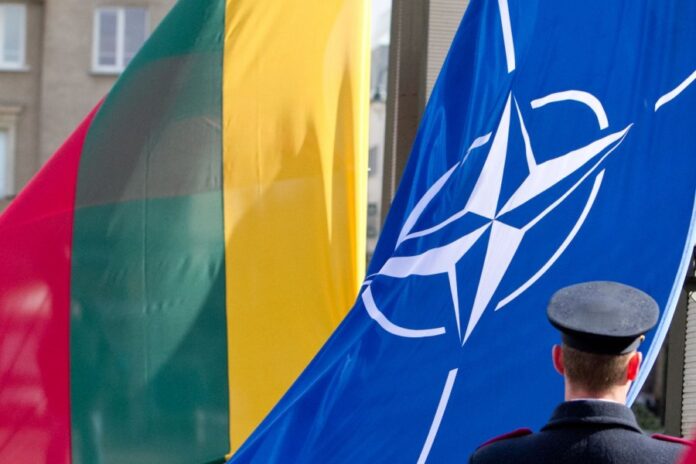
17th Anniversary of Membership
On March 29, Lithuania marked its 17th anniversary of joining NATO. On this occasion, Speaker of Parliament Viktorija Čmilytė-Nielsen noted that Lithuania has faced aggression and repressions from other countries, and being part of NATO is one of the tools to ensure the country’s national security. Lithuania joined NATO on March 29, 2004. On that day, two F-16 fighter jets from the Royal Belgian Air Force landed at Šiauliai Air Base.
To mark the anniversary, a solemn flag-raising ceremony was held in the square outside the Defence Ministry in central Vilnius. Minister of Defence Arvydas Anušauskas said that threats to national security still exist and Lithuania must ensure the continued presence of NATO forces. Alliance members must take responsibility for their security by strengthening their armed forces and increasing funds for defense but also encouraging their citizens to be pro-active in fighting cyber threats.
In 2018 the defense budget reached 2% of the gross national product, and was maintained at that level in 2020. Ruling parties have committed to ensuring that figure reaches 2.5% of GDP by 2030.
LT President Agreees with Biden
In an interview on ABC News on March 17, US president Joe Biden said he believes Putin is a killer who has no soul and will soon “pay a price” for trying to interfere in last November’s presidential election. On March 29, Lithuanian president Gitanas Nausėda was asked by the Baltic News Service whether he could call Putin a killer. He answered, “unfortunately, yes”. According to the Lithuanian president, Russia disrespects the territorial integrity of neighboring states, such as Ukraine. He sees many signs of blatant disregard for the values of the civilized world, disregard for the right of nations to self-determination, disregard for the territorial integrity of their neighbours, which the Kremlin has been showing quite demonstratively lately.
In Russia itself, the regime is “clearly shivering in the face of mounting opposition”, Nausėda said, adding that the Kremlin is persecuting opposition leaders, such as Alexei Navalny, in the “most brutal way”. Lithuania will certainly not be a country that “will sit indifferently on the back bench” and speak about greater engagement, while seeing gross violations of human rights in its neighborhood, said Nausėda.
US President Joe Biden Meets with EU Council
On March 25, US president Joe Biden attended a remote meeting of the European Council and was the first US president to meet with the leaders of all 27 EU member states in this format.
According to Lithuanian president Gitanas Nausėda, “the agenda” of the EU and the new president of the United States “or the perception of the major global challenges is very, very similar”. If the spirit of partnership remains strong, “we will certainly achieve very tangible results within the next several years,” Nauseda said. President Biden raised issues of security, human rights, democracy and choice when talking about Eastern Partnership countries, “which lack these values today” and some of them lack “a clear vision when they could join the democratic Western world even after the implementation of reforms”.
The Lithuanian president also pointed out that “the standpoint of the United States on Russia’s activities directed against Western democracies is based on principles”, which was “a good sign for Lithuania”, the presidential office said in a press release. “Lithuania and the United States are like-minded in their approach to the threats posed by Russia; they are in full agreement and support each other,” he said. Nauseda also welcomed the commitment of the United States to a broad transatlantic agenda, including climate change, fighting the pandemic, and strengthening trade and economic relations.
Restrictions Reinstated
On March 26, the Lithuanian government reinstated restrictions on movement between municipalities that will remain in place until April 6. Health Minister Arūnas Dulkys noted that the approaching holiday period may lead to an increase in the movement of persons between municipalities, which enhances the risks of contacts. As in previous restrictions, movement will be allowed between the so-called “inner circle” municipalities and large cities for work and other purposes. Lockdown has been extended until April 30.
With news from BNS, LRT.lt





























